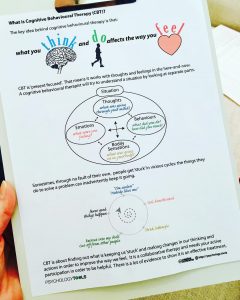Evidence-Based Treatments for Depression
What is depression? Depression causes persistent feelings of sadness, a sense of “heaviness”, alterations in appetite and sleep, and loss of interest and motivation. Depression affects how you think, feel, and act and can lead to emotional and physical problems. People with depression may have trouble doing normal day-to-day activities like work or school, and sometimes they may feel as if life isn’t worth living. Depression is more than the blues and people find they don’t just “snap out of it” by focusing on the positive. If depression lingers and persists beyond two weeks, you might have major depressive disorder, a mood disorder sometimes called “clinical depression”.
The right treatment can help a person get back to living the life they want to live. Cognitive Behavioral Therapy (CBT) for Depression, often combined with Acceptance and Commitment Therapy (ACT) and Interpersonal Therapy for Depression (IPT) is a model of therapy in which a trained therapist helps a person understand and then change thoughts, feelings, and behaviors to achieve therapeutic goals. Research by psychologists has determined that CBT, done well, works to treat depression as well as other disorders that might tag along with it. It is evidence-based. These treatment approaches also work well to help people with less severe forms of depression that might not fit into a diagnostic category but still interfere with a person living they life they want to live. Compared to some other forms of psychological treatment that might be more confined to talking in the therapy room, we use “active” treatment. People who engage in CBT, ACT, and IPT complete “homework” tasks designed to apply what they learn in the therapy office to their lives, where real change happens. Research suggests that people who actively participate in CBT, ACT, and or IPT experience reductions in depression and improvements in overall quality of life.
What about medication? Some people who have depression are prescribed certain medications called antidepressants. These medications can help to relieve depression, especially in the short term. However, research suggests, for long term relief from depression, and to prevent future major depressive episodes, it is important to change the way one thinks, feels, and behaves in life. Research suggests that CBT, ACT, and or IPT either in combination with medication treatment or alone, leads to more long-lasting benefits than medication alone. Because of this, if you choose to take medications while engaging in therapy we will gladly work with your prescribing physician to coordinate care with your permission.
